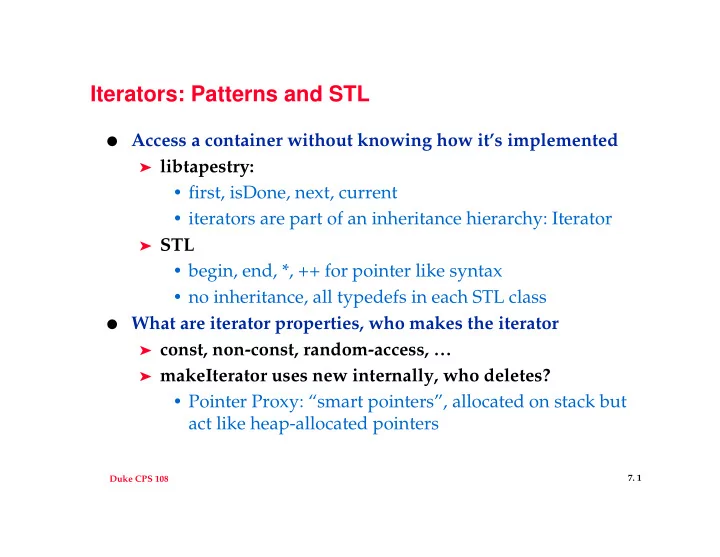

Iterators: Patterns and STL ● Access a container without knowing how it’s implemented ➤ libtapestry: • first, isDone, next, current • iterators are part of an inheritance hierarchy: Iterator ➤ STL • begin, end, *, ++ for pointer like syntax • no inheritance, all typedefs in each STL class ● What are iterator properties, who makes the iterator ➤ const, non-const, random-access, … ➤ makeIterator uses new internally, who deletes? • Pointer Proxy: “smart pointers”, allocated on stack but act like heap-allocated pointers 7. 1 Duke CPS 108
Access to map classes ● Both STL and libtapestry use a templated Pair class ➤ first, second in pair correspond to key, value in map ➤ returned by *iterator and iterator->current() ● libtapestry ➤ includes, insert, getValue: see map.h ➤ leads to redundant lookups in map implementation ● STL ➤ operator[], insert ➤ map[key] = value; inserts pair if not there ➤ potential problem with if(map[key] == …) ● hash_map is NOT standard STL, map uses red-black tree 7. 2 Duke CPS 108
templates and generic classes/functions ● STL is the standard template library ➤ part of C++ as a library of generic functions, classes, and algorithms ➤ uses no inheritance, but templates can require existence of operators/functions • in hash_map class, operator == is needed • in map class, operator < is needed ● A templated class is not code, but a code generator ➤ separation of interface and implementation is tricky ➤ implementation is a generator, not code ➤ must instantiate generator at compile time 7. 3 Duke CPS 108
Using templated functions (classes) ● Generic sort template <class Type> void sort(Vector<Type> & a, int numElts) // pre: numElts = number of elements in a // post: a[0] <= a[1] <= … <= a[numElts-1] ● What must be true of Type? ➤ Comparable ➤ ??? ● Instantiate templated function/class ➤ bind template parameters, unify types Vector<string> vs; … sort(vs,vs.size()); Vector<Vector<int> > vvi; … sort(vvi,vvi.size()); 7. 4 Duke CPS 108
templated classes ● If interface (.h) and implementation (.cc) are separate, client code must have access to implementation ➤ can define all code inline, in class (vector.h) ➤ can explicitly instantiate all uses in a separate file ➤ can #include “tempclass.cc” in .h file, problems? • -frepo flag fixes this in g++ • VC++ (and other PC compilers) use this approach ● STL classes use inline approach ➤ see the <vector> or <map> header files ● Dangers of code-bloat ➤ no literal code sharing between Vector<string> and Vector<int> 7. 5 Duke CPS 108
Where are bottlenecks? ● You can time sections of code ➤ class Ctimer accessible via “ctimer.h” ➤ you can use /bin/time or shell time • real, system, user ● You can profile code ➤ use the -pg option with compiler and run gprof (see help page) ➤ instruments code, finds how many times each function is called, what percentage of overall time each uses ● You can optimize code ➤ -O2, -O4 with g++, this can affect debugging ➤ make it run, make it right, make it fast 7. 6 Duke CPS 108
Recommend
More recommend